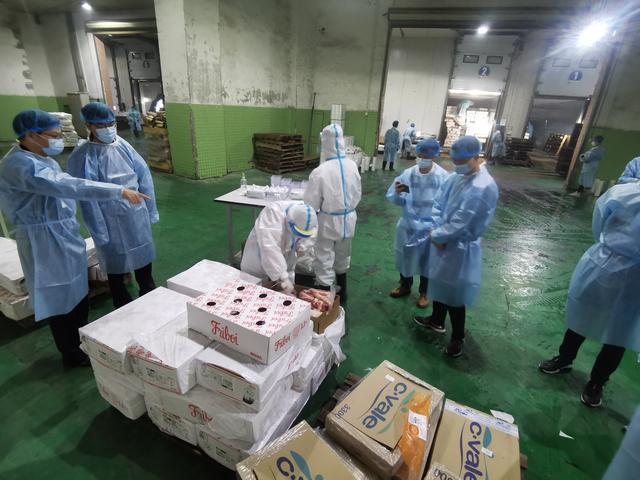
Staff members take frozen product samples to check for COVID-19 at a centralized supervisory warehouse for imported frozen products in Shenzhen. (Photo: Xinhua)
Shenzhen, Guangdong province, is taking the lead in using a centralized supervisory warehouse for imported cold-chain foods in a bid to strengthen supervision, curb the risk of COVID-19 infections and ensure smooth and efficient circulation of goods.
Specifically, all frozen and chilled meat and aquatic products imported through Shenzhen are required to pass through the new warehouse and undergo packaging disinfection as well as nucleic acid tests. The whole life cycle of imported frozen foods will also be traced.
"As the pandemic broke out overseas, cases of COVID-19 were found on packaging of imported frozen foods in some places in China. Therefore, holding a defensive line against imported cold-chain foods has become crucial to pandemic prevention and control. Shenzhen, as a megacity with over 20 million people, has huge demand for imported foods. To safeguard the public, the defensive line must be firmly built and strictly upheld," said a spokesman from the Shenzhen Municipal Administration for Market Regulation.
The centralized supervisory warehouse officially began operations on Aug 18. Data from the administration showed that by December, the warehouse had conducted 29,167 random inspections of batches, and inspected samples surpassed 168,000 units, among which a single sample tested positive for COVID-19.
Ever since the pandemic expanded overseas in March, some provinces and municipalities have detected the novel coronavirus on imported frozen food packages. To keep track of goods and lower cross-infection risks, the State Administration for Market Regulation launched a national imported cold-chain food tracking system.
Currently, nine provinces and municipalities accounting for over 90 percent of first-stop frozen food imports-including Beijing and the provinces of Zhejiang and Guangdong-are connected to the system. The system allows cross-regional data recognition, and allows for full industrial chain tracing, from Customs entrance, wholesale and retail, to end-user services.
Chen Xu, a State Administration for Market Regulation market inspector, said at a recent news conference that the past months have seen several regions reporting imported cold-chain foods testing positive for COVID-19. Local administrations for market regulation should fulfill their responsibilities for good inspections, food safety checks, trace management and personnel management.
Cold-chain products lacking proof of disinfection, nucleic acid test certificates or traceable and trustworthy origins must be denied importation, Chen said.
Ethan Bai, CEO of Shenzhen-based frozen meat and seafood import platform Optima Integration Group, said: "Before entering the market, our imported frozen foods must obtain four certificates-Customs inspection and quarantine certificates, disinfection certificates, nucleic acid testing certificates and information tracing certificates. Supervision levels have been raised and circulation process was thus affected."
To address improving circulation practices, the Shenzhen Municipal Administration for Market Regulation has worked hard to optimize supervisory procedures.
According to the administration, storage, loading and unloading, disinfection and sampling inspections were formerly not proceeding smoothly or efficiently amid the pandemic. It took over 24 hours for a container to enter and leave the warehouse. With joint efforts made by the Shenzhen Administration for Market Regulation, the Shenzhen Municipal Health Commission, the Shenzhen Municipal Public Security Bureau and other related departments, processing times were cut to an average of six hours and 36 minutes.
"We see the efforts made by local governments and we believe the inconveniences are only temporary. With various measures gradually taking effect, as well as rising public awareness of cold-chain food risks, the entire industry will embrace a new normal and related issues will be properly resolved," Bai said.
Regarding foreign media reports that China was creating obstacles to cold-chain food imports, Bi Kexin, head of the Bureau of Import and Export Food Safety at the General Administration of Customs, said: "The Chinese government's supervision is a crucial link to preventing the coronavirus from flowing into the market via cold-chain food channels. The process conforms to WTO regulations and does not impede the development of normal international trade."
Optima's Bai said that ever since COVID-19 hit in China, the country has undertaken great prevention and control efforts. The current contagion situation has been a hard-earned outcome. Disinfection and sampling testing procedures for cold-chain foods were carried out due to the need to contain the spread of the contagion.
"China is a responsible major nation. It is also a member of the WTO. It has huge demand for agricultural product imports to supplement the domestic market. There is no way that China would place obstacles to imported frozen foods or oppose free trade," Bai said.
In fact, foreign factories shut down due to goods testing positive for COVID-19 have been allowed to resume exports to China after corrective actions were taken. This proves that all measures China had taken were put in place out of risk control requirements, he added.
Shenzhen's successful practice has been studied and adopted by other cities around the nation. Currently, 15 groups of inspection personnel have already visited Shenzhen's centralized supervisory warehouse, and the Shenzhen Municipal Administration for Market Regulation plans to share its experience and promote the practice in more regions and municipalities in China.


